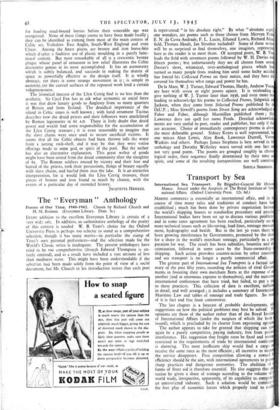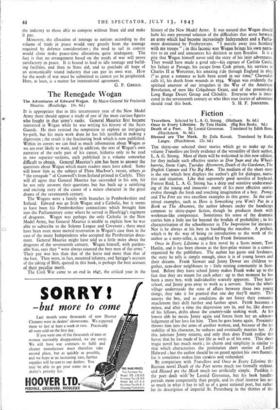Transport by Sea
International Sea Transport. By Brigadier-General Sir Osbo Mance. Issued under the Auspices of The Royal Institute of In national Affairs. (Oxford University Press. 12s. 6d.) MARINE commerce is essentially an international affair, and in course of time many rules and traditions of conduct have b established ; much has been done by private negotiation betw the world's shipping houses to standardise procedure and pract International bodies have been set up to discuss various problem and in some cases agreement has been reached, particularly on more technical issues such as life-saving, load-lines, tonnage measu ment, hydrography and health. But in the last 5o years there been growing interference. by Governments, promoted by the des for a share in the world's merchant tonnage, particularly as a IN paration for war. The result has been subsidies, bounties and crimination, followed in some cases by the State-ownership shipping. Such action provokes counter-action by other countri and sea transport is no longer a purely commercial affair.
The greater part of International Sea Transport is a factual s mary of the past fifty years, recording the policies of "rival Gov ments in fostering their own merchant fleets at the expense of another (and at enormous expense to themselves), and the numer international conferences that have tried, but failed, to put a to these practices. This collecion of data is excellent, suffia in detail, and well arranged ; it includes a summary of Intematio Maritime Law and tables of tonnage and trade figures. So m of it is fact and free from controversy.
The last chapter is a forecast of probable developments, w suggestions on how the political problems may best be solved. opinions are those of the author rather than of the Royal Insti of International Affairs (under the auspices of which the book issued), which is precluded by its charter from expressing opini
The author appears to take for granted that shipping can n again be a purely competitive, paying industry, free from poll interference. His suggestion that freight rates be fixed and ton restricted to the requirements of trade by international confere is alarming. The most inefficient ship would find a cargo receive the same rates as the most efficient ; all incentive to imp the service disappears. Free competition allowing a reward 'efficiency should be the aim, with international agreements to prey sharp practices and dangerous economies. The abolition of forms of State aid is therefore essential. He also suggests that nation be giyen a share of tonnage according to the volume of world trade, irrespective, apparently, of its capability to, compete an unrestricted industry. Such a solution would be contrary the free play of economic forces which properly tend to co
the industry to those ab:e to compete without State aid and make it pay.
Moreover, the allocation of tonnage to nations according to the volume of trade in peace would vary greatly from the tonnage required by defence considerations ; the need to sail in convoy would alone make peace-time allocations quite inadequate. The fact is that no arrangement based on the needs of war will prove satisfactory in peace. It is bound to lead to idle tonnage and build- ing facilities, and then to State aid, and to preclude all hope of an economically sound industry that can pay its own way. How far the needs of war must be submitted to cannot yet be prophesied. Here, at least, is a matter for international agreement.
G. P. GRIGGS.



























 Previous page
Previous page